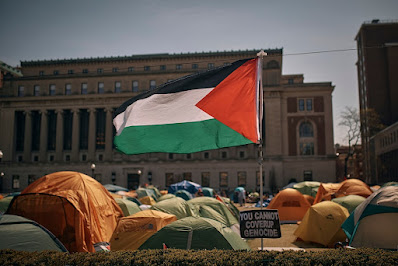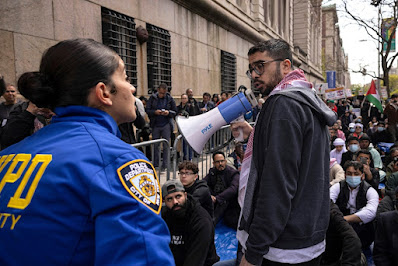At Least 2,000 People Arrested in Pro-Palestinian Protests on US Campuses, AP Tally Shows
Body camera video from police when they broke up a demonstration at Columbia University shows officers having to move tables and other big furniture to get to the protests and even having to cut through chains at one point.
BY RYAN PEARSON, JULIE WATSON, JAKE OFFENHARTZ AND JOSEPH B. FREDERICK
6:33 PM EDT, May 2, 2024
LOS ANGELES (AP) — Police have arrested more than 2,000 people during pro-Palestinian protests at college campuses across the United States in recent weeks, according to an Associated Press tally Thursday.
Demonstrations and arrests have occurred in almost every corner of the nation. In the last 24 hours, they’ve drawn the most attention at the University of California, Los Angeles, where chaotic scenes played out early Thursday when officers in riot gear surged against a crowd of demonstrators.
Hundreds of protesters at UCLA defied orders to leave, some forming human chains as police fired flash-bangs to break up the crowds.
At least 200 people were arrested, said Sgt. Alejandro Rubio of the California Highway Patrol, citing data from the Los Angeles County Sheriff’s Department. Rubio said they were being booked at the county jails complex near downtown Los Angeles.
What to know about student protests
What’s happening: Student protests over the Israel-Hamas war have popped up at many college campuses following the arrest of demonstrators in April at Columbia University.
On campus: As students around the country protest, student journalists are covering their peers in a moment of uncertainty.
Another 300 people voluntarily left throughout the hourslong standoff, some filing out of the encampment with their hands over their heads in a show of peaceful surrender, according to the university. Others ran away as baton-wielding officers pushed into the hordes that numbered more than 1,000 people.
Later Thursday morning, workers removed barricades and dismantled the protesters’ fortified encampment. Bulldozers scooped up bags of trash and tents. Royce Hall was covered in graffiti.
Tent encampments of protesters calling on universities to stop doing business with Israel or companies they say support the war in Gaza have spread across campuses nationwide in a student movement unlike any other this century.
The demonstrations began at Columbia University on April 17, with students calling for an end to the Israel-Hamas war, which has killed more than 34,000 Palestinians in the Gaza Strip, according to the Health Ministry there. Israel launched its offensive in Gaza after Hamas militants killed about 1,200 people, mostly civilians, and took roughly 250 hostages in an attack on southern Israel on Oct. 7.
UCLA Chancellor Gene Block said in statement Thursday that the encampment had become “a focal point for serious violence as well as a huge disruption.” He said days of clashes between demonstrators and counterdemonstrators endangered people on campus, students were unable to get to class, buildings had to be closed and classes were canceled.
“The past week has been among the most painful periods our UCLA community has ever experienced,” he said. “It has fractured our sense of togetherness and frayed our bonds of trust, and will surely leave a scar on the campus.”
California Highway Patrol officers poured into the UCLA campus by the hundreds early Thursday. Wearing face shields and protective vests, they held their batons out to separate themselves from demonstrators, who wore helmets and gas masks and chanted: “You want peace. We want justice.”
For hours, officers warned over loudspeakers that there would be arrests if the crowd did not disperse. Protesters and police shoved and scuffled. Police helicopters hovered and the sound of flash-bangs pierced the air. Police pulled off protesters’ helmets and goggles as they made arrests.
Police methodically tore apart the encampment’s barricade of plywood, pallets, metal fences and dumpsters, then pulled down canopies and tents.
The law enforcement presence and continued warnings contrasted with the scene Tuesday night, when counterdemonstrators attacked the pro-Palestinian encampment. No one was arrested, but at least 15 protesters were injured.
Authorities’ tepid response drew criticism from political leaders, including California Gov. Gavin Newsom and officials pledged an independent review.
Ariel Dardashti, a graduating UCLA senior studying global studies and sociology, said no student should feel unsafe on campus.
“It should not get to the point where students are being arrested,” Dardashti said on campus Thursday.
Dardashti said he can relate to the trauma suffered by Palestinians.
“When my dad was fleeing Iran, he prayed that his children wouldn’t have to face antisemitism,” Dardashti said. “We’re afraid of having to flee again in the same way our parents did.”
Iranian state television carried live images of the police action at UCLA, as did Qatar’s pan-Arab Al Jazeera satellite network. Live images of Los Angeles also played across Israeli television networks.
Israel has branded the protests antisemitic, while Israel’s critics say it uses those allegations to silence opposition. Although some protesters have been caught on camera making antisemitic remarks or violent threats, protest organizers — some of whom are Jewish — call it a peaceful movement to defend Palestinian rights and protest the war.
President Joe Biden on Thursday defended the students’ right to peaceful protest but decried the disorder of recent days.
California Republican leaders blasted university administrations for failing to protect Jewish students and allowing protests to escalate into “lawlessness and violence.” They called for the firing of leaders at UCLA and Cal Poly Humboldt and pushed for a proposal that would cut pay for university administrators.
“We’ve got a whole lot of people in these universities drawing six figure salaries and they stood by and did nothing,” Assembly Republican Leader James Gallagher told reporters.
Meanwhile, protest encampments at schools across the U.S. were cleared by police — resulting in more arrests — or closed up voluntarily.
A college professor from Illinois said he suffered multiple broken ribs and a broken hand during a pro-Palestine protest on Saturday at Washington University in St. Louis.
Bystander video shows the arrest of Steve Tamari, a history professor at Southern Illinois University Edwardsville. He seems to be moving in to take video or photos of protesters being detained when multiple officers roughly take him down.
In a post on the social platform X, Sandra Tamari said her husband needed surgery on his hand and has nine broken ribs.
Tamari said in a statement Thursday that it was “a small price to pay for Israel’s ongoing genocide in Gaza.” Campus police referred questions to the university’s communications department, which did not respond to a request for comment.
Elsewhere, University of Minnesota officials reached an agreement with protesters not to disrupt commencements. Similar agreements have been made at Northwestern University in suburban Chicago and Brown University in Rhode Island.
Meanwhile, a professors group at Columbia University condemned school leadership on Thursday for asking police to remove protesters in what the group called a “horrific police attack on our students.” Officers burst into a building Tuesday, breaking up a demonstration that had paralyzed the school.
___
Offenhartz and Frederick reported from New York. Associated Press journalists around the country contributed to this report, including Ethan Swope, Krysta Fauria, John Antczak, Christopher L. Keller, Lisa Baumann, Stefanie Dazio, Jae C. Hong, Colleen Long, Karen Matthews, Sarah Brumfield, Carolyn Thompson, Philip Marcelo, Steve Karnowski and Eugene Johnson.



















